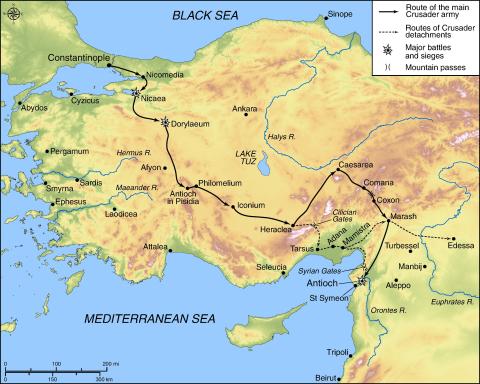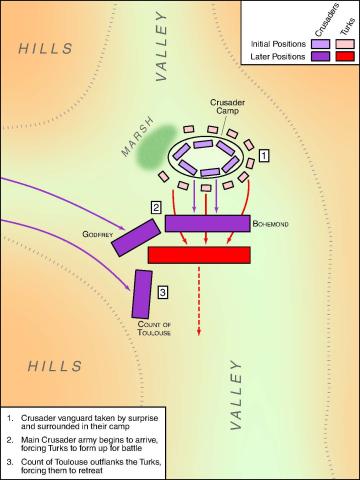The Battle of Dorylaeum
[3.9.7] Et nisi Dominus fuisset nōbīscum in bellō, et aliam cito nōbīs mīsisset aciem, nūllus nostrōrum ēvāsisset, quia ab hōrā tertiā usque in hōram nōnam perdūrāvit haec pugna. Sed omnipotēns Deus, pius et misericors, quī nōn permīsit suōs mīlitēs perīre nec in manibus inimīcōrum incīdere, festīne nōbīs adiūtōrium mīsit. Sed fuērunt illīc mortuī duo ex nostrīs mīlitēs honōrābilēs, scīlicet Gosfredus dē Monte Scabiōsō, et Willelmus Marchīsī fīlius, frāter Tancredī, aliīque mīlitēs et peditēs quōrum nōmina ignōrō.
[3.9.8] Quis umquam tam sapiēns aut doctus audēbit dēscrībere prūdentiam mīlitiamque et fortitūdinem Turcōrum? Quī putābant terrēre gentem Francōrum minīs suārum sagittārum, sīcut terruērunt Ārabēs, Saracēnōs, et Armēniōs, Syranīōs et Grecōs? Sed, sī Deō placet, numquam tantum valēbunt, quantum nostrī. Vērumtamen dīcunt sē esse dē Francōrum generātiōne, et quia nūllus homō nātūrāliter dēbet esse mīles nisi Francī et illī. Vēritātem dīcam quam nēmō audēbit prohibēre. Certē sī in fidē Chrīstī et Chrīstiānitāte sānctā semper firmī fuissent, et ūnum Deum in Trīnitāte cōnfitērī voluissent Deīque Fīlium, nātum dē Virgine mātre, passum, et resurrēxisse ā mortuīs, et in caelum ascendisse suīs cernentibus discipulīs, cōnsōlātiōnemque Sānctī Spīritūs perfectē mīsisse, et eum in caelō et in terrā rēgnantem rēctā mente et fidē crēdidissent, ipsīs potentiōrēs vel fortiōrēs vel bellōrum ingeniōsissimōs nūllus invenīre potuisset. Et tamen, grātiā Deī, victī sunt ā nostrīs. Hōc bellum est factum, prīmō diē Iūliī.
notes
(July 1097) Our author thanks God for the miraculous victory. He reflects on the skill and bravery of the Turks, but thinks that because of their lack of Christian faith they will never triumph over the crusaders.
3.9.7
aciem: the Franks summoned by Bohemond in 3.9.3.
ab hōrā … haec pugna: the battle lasted from around 9:00 AM to 3:00 PM. Our author is using the Roman method of counting twelve hours in a day, starting at dawn.
quī nōn permīsit suōs mīlitēs perīre: Note the tense. Given that our author is about to mention some casualties by name he is either exaggerating here or is focused on his own survival. He is also ignoring what happened to People's Crusade.
Gosfredus dē Monte Scabiōsō: Godfrey of Monte Scaglioso, or possibly Humphrey of Monte Scaglioso.
Willelmus Marchīsī fīlius: William “son of the Marquis.”
3.9.8
Quī putābant terrēre gentem Francōrum: "who thought (that they) would terrify the race of the Franks."
numquam tantum valēbunt, quantum nostrī: “They will never be as strong as our men.” Our author comments in his own voice.
Vērumtamen dīcunt … generātiōne: This thought appears also in a 7th century chronicle attributed to Fredegar (see the note in Russo's edition); it was presumably not something the Turks actually said.
Sānctī Spīritūs perfectē mīsisse: The language here approximates that of the Nicene Creed.
ipsīs potentiōrēs … nūllus invenīre potuisset: This is the oldest evidence for the mutual respect of Franks and Turks.
vocabulary
3.9.7
cito: quickly
festīne: hastily
3.9.8
terreō terrēre teruī territum: to overawe, terrify
quia: “that” (ML).
vērumtamen: nevertheless
prohibeo prohibēre prohibuī prohibitum: to deny (ML)
patior patī passus: to suffer, endure
consōlātiō –ōnis, f.: consolation (CL); comfort (ML).
perfectē: completely


